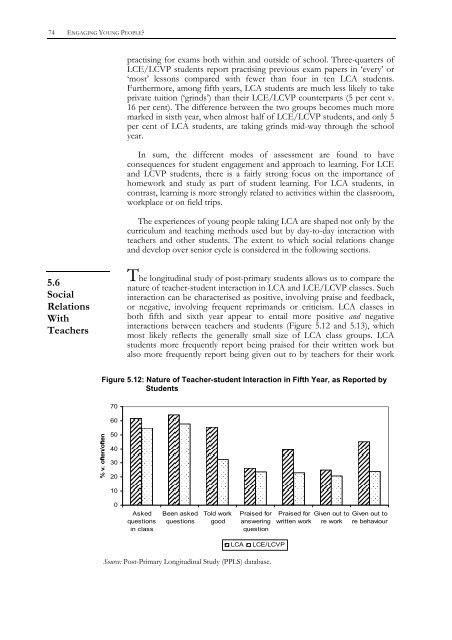Student Experiences of the Leaving Certificate Applied Programme
Student Experiences of the Leaving Certificate Applied Programme
Student Experiences of the Leaving Certificate Applied Programme
You also want an ePaper? Increase the reach of your titles
YUMPU automatically turns print PDFs into web optimized ePapers that Google loves.
74 ENGAGING YOUNG PEOPLE?practising for exams both within and outside <strong>of</strong> school. Three-quarters <strong>of</strong>LCE/LCVP students report practising previous exam papers in ‘every’ or‘most’ lessons compared with fewer than four in ten LCA students.Fur<strong>the</strong>rmore, among fifth years, LCA students are much less likely to takeprivate tuition (‘grinds’) than <strong>the</strong>ir LCE/LCVP counterparts (5 per cent v.16 per cent). The difference between <strong>the</strong> two groups becomes much moremarked in sixth year, when almost half <strong>of</strong> LCE/LCVP students, and only 5per cent <strong>of</strong> LCA students, are taking grinds mid-way through <strong>the</strong> schoolyear.In sum, <strong>the</strong> different modes <strong>of</strong> assessment are found to haveconsequences for student engagement and approach to learning. For LCEand LCVP students, <strong>the</strong>re is a fairly strong focus on <strong>the</strong> importance <strong>of</strong>homework and study as part <strong>of</strong> student learning. For LCA students, incontrast, learning is more strongly related to activities within <strong>the</strong> classroom,workplace or on field trips.The experiences <strong>of</strong> young people taking LCA are shaped not only by <strong>the</strong>curriculum and teaching methods used but by day-to-day interaction withteachers and o<strong>the</strong>r students. The extent to which social relations changeand develop over senior cycle is considered in <strong>the</strong> following sections.5.6SocialRelationsWithTeachersThe longitudinal study <strong>of</strong> post-primary students allows us to compare <strong>the</strong>nature <strong>of</strong> teacher-student interaction in LCA and LCE/LCVP classes. Suchinteraction can be characterised as positive, involving praise and feedback,or negative, involving frequent reprimands or criticism. LCA classes inboth fifth and sixth year appear to entail more positive and negativeinteractions between teachers and students (Figure 5.12 and 5.13), whichmost likely reflects <strong>the</strong> generally small size <strong>of</strong> LCA class groups. LCAstudents more frequently report being praised for <strong>the</strong>ir written work butalso more frequently report being given out to by teachers for <strong>the</strong>ir workFigure 5.12: Nature <strong>of</strong> Teacher-student Interaction in Fifth Year, as Reported by<strong>Student</strong>s7060% v. <strong>of</strong>ten/<strong>of</strong>ten50403020100Askedquestionsin classBeen askedquestionsTold workgoodPraised foransweringquestionPraised for Given out to Given out towritten work re work re behaviourLCALCE/LCVPSource: Post-Primary Longitudinal Study (PPLS) database.

















